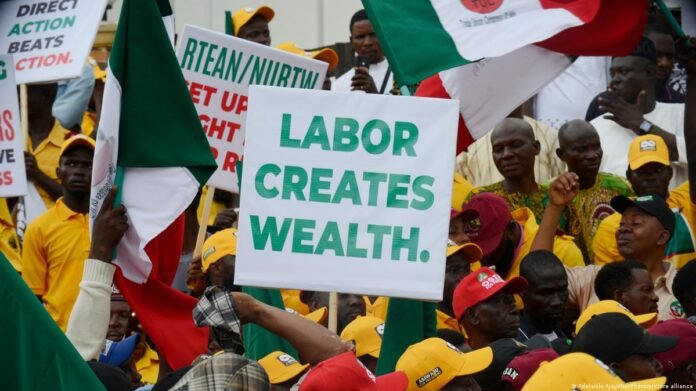The Nigeria Labour Congress (NLC) and federal government workers are demanding a swift review of the national minimum wage, insisting that the current ₦70,000 is no longer sustainable.
They point to states like Lagos, Imo, and Rivers that have recently raised wages above the national benchmark in response to rising inflation, food costs, and transport fares. For many workers, survival on ₦70,000 is now almost impossible.
President Bola Tinubu signed the National Minimum Wage Act into law in July 2024, raising wages from ₦30,000 to ₦70,000 across public and private sectors.
But several states have since gone further. On August 27, 2025, Governor Hope Uzodinma of Imo announced ₦104,000 for civil servants after consultations with labour unions. Lagos and Rivers had earlier approved ₦85,000, with Lagos promising a raise to ₦100,000 in 2025.
Bayelsa, Niger, Enugu, and Akwa Ibom now pay ₦80,000, while Ogun and Delta stand at ₦77,000. Benue and Osun workers receive ₦75,000, and Ondo pegs wages at ₦73,000. For labour leaders, this is a wake-up call to Abuja.
Workers Cry Out
Mr. Benson Upah, Acting General Secretary of the NLC, said inflation has eaten away the ₦70,000 minimum wage, leaving many workers in despair.
“The truth is that ₦70,000 is not sustainable under the present economic situation. Workers are under immense pressure, and unless the government responds quickly, the crisis of survival will only worsen,” he said.
He added that while labour prefers dialogue, industrial action may be considered if negotiations stall.
Mr. Shehu Mohammed, President of the Association of Senior Civil Servants of Nigeria (ASCSN), was blunt. “Right from the beginning, our demand was for a living wage. We submitted ₦250,000 as a reasonable benchmark. Anything short of that only takes a worker to the gate of the office, not back home.”
He explained that electricity bills, transport fares, and food prices have made ₦70,000 almost worthless. “Even if you pay electricity bills, what remains cannot sustain a family for 10 days.”
Daily Struggles
Federal workers echoed the pain. Mrs. Kemi George, a civil servant, said, “By the time I pay transport to work and buy food, nothing is left. Rent and school fees are almost impossible to cover.”
Another worker, Mr. Obi Chimaobi, called the situation unbearable. “Things are no longer affordable. A bag of rice is now like gold, transport fares keep rising daily, and with ₦70,000, you are already in debt before the month even ends.”
Mrs. Bola Akingbade stressed that “a well-paid workforce is a motivated workforce.” She argued that financial security boosts productivity and reduces corruption risks in ministries and agencies.
Call for Fairness
Mr. Jeremiah Okon said if states with smaller revenues could raise wages, then the federal government must follow. “It will be fair and equitable to adjust the minimum wage from ₦70,000 to at least ₦150,000.”
He added that higher wages should not be seen as a burden but as an economic driver. “Increased wages will percolate through spending on goods and services, stimulating local businesses and boosting the economy.”
Rate, Like 👍, Comment💬, share this article and Follow us on our social media handles. You can also Submit your own story to get featured and earn rewards!







